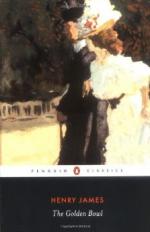It was her one purely good fortune that she could feel thus sure impertinence—to her at any rate—was not among the arts on which he proposed to throw himself; for though he had, in so almost mystifying a manner, replied to nothing, denied nothing, explained nothing, apologised for nothing, he had somehow conveyed to her that this was not because of any determination to treat her case as not “worth” it. There had been consideration, on both occasions, in the way he had listened to her—even though at the same time there had been extreme reserve; a reserve indeed, it was also to be remembered, qualified by the fact that, on their second and shorter interview, in Portland Place, and quite at the end of this passage, she had imagined him positively proposing to her a temporary accommodation. It had been but the matter of something in the depths of the eyes he finally fixed upon her, and she had found in it, the more she kept it before her, the tacitly-offered sketch of a working arrangement. “Leave me my reserve; don’t question it—it’s all I have, just now, don’t you see? so that, if you’ll make me the concession of letting me alone with it for as long a time as I require, I promise you something or other, grown under cover of it, even though I don’t yet quite make out what, as a return for your patience.” She had turned away from him with some such unspoken words as that in her ear, and indeed she had to represent to herself that she had spiritually heard them, had to listen to them still again, to explain her particular patience in face of his particular failure. He hadn’t so much as pretended to meet for an instant the question raised by her of her accepted ignorance of the point in time, the period before their own marriage, from which his intimacy with Charlotte dated. As an ignorance in which he and Charlotte had been personally interested—and to the pitch of consummately protecting, for years, each other’s interest—as a condition so imposed upon her the fact of its having ceased might have made it, on the spot, the first article of his defence. He had vouchsafed it, however, nothing better than his longest stare of postponed consideration. That tribute he had coldly paid it, and Maggie might herself have been stupefied, truly, had she not had something to hold on by, at her own present ability, even provisional, to make terms with a chapter of history into which she could but a week before not have dipped without a mortal chill. At the rate at which she was living she was getting used hour by hour to these extensions of view; and when she asked herself, at Fawns, to what single observation of her own, in London, the Prince had had an affirmation to oppose, she but just failed to focus the small strained wife of the moments in question as some panting dancer of a difficult step who had capered, before the footlights of an empty theatre, to a spectator lounging in a box.




